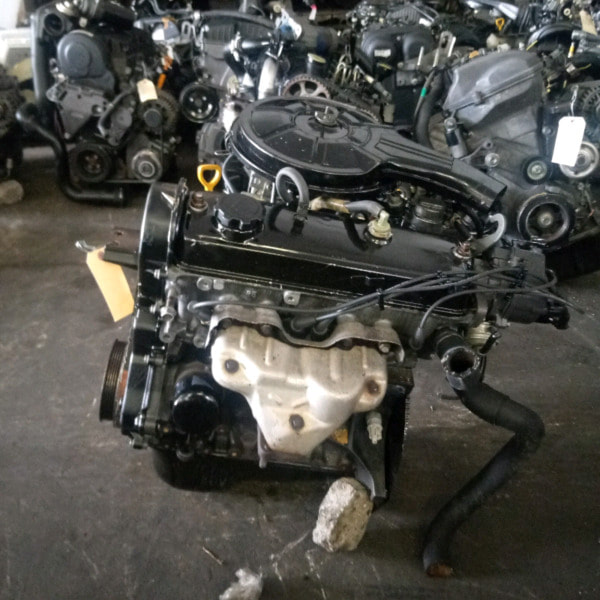Engine Purchasing Specialist Tips on Picking the Right Engine for Your Specific Needs
Choosing the best engine for your particular needs involves a complex interaction of factors that go past simple horse power numbers. By delving into the intricacies of power versus efficiency, reviewing gas rankings, and budgeting for lasting prices, one can really maximize their engine choice.
Power Vs. Efficiency: Locating the Balance

When choosing an engine, it is essential to strike an equilibrium in between power and efficiency to satisfy your specific needs efficiently. Power refers to the engine's capability to generate power for propulsion, identifying factors like velocity, pulling capability, and overall efficiency (Toyota Tazz Engine For Sale). On the other hand, performance connects to how well the engine makes use of gas to generate power, impacting factors such as gas economy and ecological friendliness
Attaining the ideal balance in between power and efficiency is crucial since an engine that is too effective might take in excessive fuel, leading to greater operating costs and unnecessary pressure on the atmosphere. Alternatively, an engine that prioritizes performance over power may cause slow efficiency, particularly popular situations like lugging hefty loads or driving uphill.
To make a notified choice, think about variables such as your common driving problems, the intended use the vehicle, and your individual preferences. By reviewing your concerns and requirements, you can choose an engine that strikes the excellent balance in between power and efficiency, making sure optimal performance while minimizing environmental effect and operating expense.
Comprehending Engine Dimension and Type

In addition, engine type plays a critical duty in determining the performance features of an engine. Common engine types include inline engines, V engines, and rotating engines, each with its distinct advantages and downsides. The engine kind impacts aspects such as the engine's size, weight circulation, and power shipment. Comprehending the interplay between engine size and type is essential in picking an engine that straightens with your details needs and priorities, whether it be power, performance, or a balance of both.
Consider Your Car's Requirements
Considering your car's requirements is a basic step in the engine option procedure to guarantee optimal performance and capability. It is important to assess factors such as the planned usage of the car, its weight, lugging capability, and gas efficiency requirements. For example, if you are searching for an engine for a sturdy truck that will be made use of for towing, you will require a powerful engine with high torque capabilities. On the various other hand, if you are selecting an engine for a small car mostly made use of for city travelling, gas efficiency may be a much more critical element to think about.

Examining Gas Performance Ratings
Examining fuel efficiency ratings is an important facet of picking the ideal engine for your car, making certain price savings and environmental sustainability. Gas performance ratings, usually gauged in miles per gallon (MPG) for fuel engines or kilowatt-hours per 100 miles (kWh/100 miles) for electrical engines, suggest how much an automobile can travel on a specific quantity of fuel or electricity. Higher MPG or reduced kWh/100 miles values indicate much more efficient engines, equating to reduced gas expenses and lower carbon exhausts.
When reviewing fuel efficiency rankings, consider your driving practices and requirements. A Related Site very fuel-efficient engine can result in substantial cost savings over time if you commute long distances daily. In addition, compare different engine options within the same automobile class to identify one of the most cost-effective selection. Aspects such as engine size, weight, the rules of aerodynamics, and crossbreed or electric capacities can all influence gas effectiveness.
Budgeting for Long-Term Costs
Purposefully planning for lasting expenditures is vital when choosing an engine, making certain economic sustainability over the vehicle's life expectancy. While the preliminary acquisition rate of an engine is a considerable aspect, it is vital to consider the lasting expenses associated with upkeep, repair services, and fuel consumption.
Furthermore, researching the accessibility and cost of substitute parts for the picked engine is vital in budget plan planning. By meticulously budgeting for these long-lasting expenditures and factoring them into the decision-making procedure, individuals can choose an engine that not just meets their prompt needs yet find more also stays cost-efficient throughout its life-span.
Conclusion
Finally, choosing the appropriate engine for your particular requirements requires balancing power and effectiveness, understanding engine size and kind, considering your vehicle's demands, reviewing gas performance rankings, and budgeting for lasting costs. By carefully taking into consideration these variables, you can guarantee that you pick an engine that meets your needs and gives optimum efficiency for your lorry.
To further improve the selection procedure of an engine that strikes the optimum equilibrium in between power and performance, it is important to delve right into the intricacies of understanding engine dimension and type. Engine dimension refers to the overall volume of air and fuel that can be pushed with the engine cyndrical tubes. Typical engine types include inline engines, V engines, and rotary engines, each with its distinct benefits and downsides. Comprehending the interplay between engine dimension and kind is essential in picking an engine that lines up with your particular requirements and priorities, whether it be power, efficiency, or an equilibrium of both.
Gas performance scores, normally determined in miles per gallon (MPG) for gas engines or kilowatt-hours per 100 miles (kWh/100 miles) for electric engines, show just how much a his explanation car can travel on a specific amount of fuel or power.